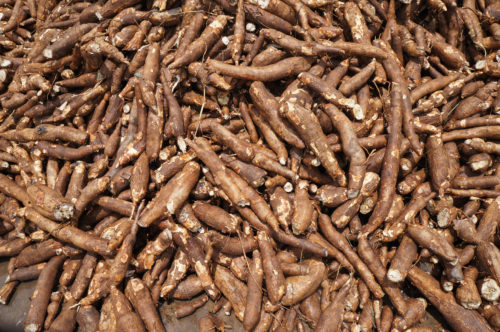Harvestplus, IFAD Train Women On Vitamin A Sassava Value Chain
Harvestplus, an international agricultural organistaion, in collaboration with International Fund for Agricultural Development (IFAD), on Tuesday, trained 60 women on vitamin A cassava processing and value addition in Ibadan.
The training focused on processing of garri, using stainless steel manual and automated roasters and processing of odourless fufu, best practices for quality control.
It also included making of snacks (combobite) from vitamin A cassava flour and beans.
The Country Manager of Harvestplus, Dr Paul Ilona, said that the participants comprised 10 women each from Anambra, Ebonyi, Benue, Ogun, Niger and Taraba states.
He added that food consumption in Nigeria had a cultural background which did not consider essential nutrients, “but focused on filling up the stomach.”
He noted that Harvestplus believed that making staple crops such as cassava, sweet potato, maize, millet, rice and others to become sources of vitamin A, iron and zinc would improve nutrition and make Nigerians better.
According to him, the Federal Ministry of Agriculture through its Variety Release Committee, approved 16 varieties of vitamin A cassava, maize and sweet potato for cultivation in Nigeria in the last five years.
Ilona said “the demand for these more nutritious crops, foods has continued to grow with increasing awareness and scientific evidence on their health and economic benefits.
“The challenge remains the supply of seeds to farmers, raw materials to industries, foods to consumers, thus making nutritious food sector attractive to investors, youths and women.
“Consequently, there is need to equip these groups of people with necessary skills and knowledge that will not only translate to improved nutrition, but increased income and better livelihood.”
The country manager disclosed that Harvestplus worked with experts in the food and nutrition sectors to develop 25 food products from vitamin A cassava, targeting the complementary, traditional and fast food sectors.
“These products can be produced on micro, small, medium and large scale, we have trained thousands, most of which are currently gainfully employed in the sector,” he said.
Dr Ameh Onoja, the National Programme Coordinator of IFAD, represented by Mrs Kehinde Oduntan, the IFAD Knowledge, Management and Communication Adviser (KMCA) said that the fund
had been training youths on cassava stem and rice seed multiplication.
He added that “this particular training is also to develop recipes from vitamin A cassava and empower women to use the recipe to produce
pastries.
“This is the first batch of the training, the second one will be next week.”



Comments are closed.